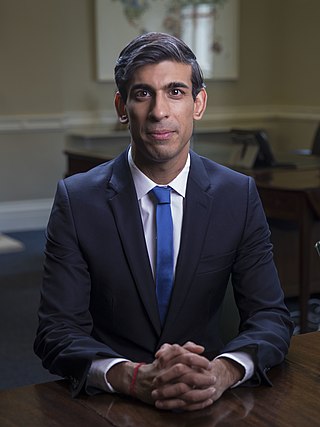A spending review, or occasionally a comprehensive spending review, is a governmental process in the United Kingdom carried out by HM Treasury to set firm expenditure limits and, through public service agreements, define the key improvements that the public can expect from these resources.

The United Kingdom government austerity programme was a fiscal policy that was adopted for a period in the early 21st century following the era of the Great Recession. Coalition and Conservative governments in office from 2010 to 2019 used the term, and it was applied again by many observers to describe Conservative Party policies from 2021 to 2024, during the cost of living crisis. With the exception of the short-lived Truss ministry, the governments in power over the second period did not formally re-adopt the term. The two austerity periods are separated by increased spending during the COVID-19 pandemic. The first period was one of the most extensive deficit reduction programmes seen in any advanced economy since the Second World War, with emphasis placed on shrinking the state, rather than consolidating fiscally as was more common elsewhere in Europe.

Rishi Sunak is a British politician who served as Prime Minister of the United Kingdom from 2022 to 2024. He was Leader of the Conservative Party from October 2022 to November 2024. Following his defeat to Keir Starmer's Labour Party in the 2024 general election, he became Leader of the Opposition, serving in this role from July to November 2024. He previously held two Cabinet positions under Boris Johnson, latterly as Chancellor of the Exchequer from 2020 to 2022. Sunak has been Member of Parliament (MP) for Richmond and Northallerton, previously Richmond (Yorks), since 2015.

The 2020 United Kingdom budget, officially known as Budget 2020: Delivering on Our Promises to the British People, was a budget delivered by Rishi Sunak, Chancellor of the Exchequer, to the House of Commons on Wednesday 11 March 2020. It was Sunak's first budget, the first since the withdrawal of the United Kingdom from the European Union, the first since Boris Johnson becoming Prime Minister and the first to be held in the spring since March 2017.

The March 2021 United Kingdom budget, officially known as Protecting the Jobs and Livelihoods of the British People was a budget delivered by Rishi Sunak, the Chancellor of the Exchequer in March 2021. It was expected to be delivered in autumn 2020, but was postponed because of the COVID-19 pandemic. It succeeds the budget held in March 2020, and the summer statement and Winter Economy Plan held in summer and autumn 2020, respectively. The budget is the second under Boris Johnson's government, also the second to be delivered by Sunak and the second since Britain's withdrawal from the European Union. The budget was the first for government expenditure in the United Kingdom to exceed £1 trillion.

In response to the COVID-19 pandemic in the United Kingdom, the UK Government introduced various public health and economic measures to mitigate its impact. Devolution meant that the four nations' administrative responses to the pandemic differed; the Scottish Government, the Welsh Government, and the Northern Ireland Executive produced different policies to those that apply in England. Numerous laws were enacted or introduced throughout the crisis.

The Coronavirus Job Retention Scheme (CJRS) was a furlough scheme announced by Rishi Sunak, the Chancellor of the Exchequer, on 20 March 2020, during the COVID-19 pandemic in the United Kingdom. The scheme was announced as providing grants to employers to pay 80% of a staff wage and employment costs each month, up to a total of £2,500 per person per month. The scheme covered the period 1 March 2020 until 30 September 2021, and had a total cost of £70 Billion. The scheme initially ran for three months and was backdated to 1 March.
Project Birch is the British government's bailout plan to help save companies that are critical to the British economy during the COVID-19 pandemic. It was announced in May 2020. As of September 2020, only one company has qualified for help.

The Winter Economy Plan was a statement from the British Government, or mini-budget statement, delivered on 24 September 2020 by Rishi Sunak, the Chancellor of the Exchequer. It succeeded the summer statement held earlier in the year, and was a partial replacement to the cancelled budget scheduled for the Autumn. The purpose of the statement was to announce measures aimed at further helping to promote economic recovery following the impact of the COVID-19 pandemic. The statement was delivered to the House of Commons. The plan aimed to further promote economic recovery while preserving jobs and businesses which were considered viable.

Rishi Sunak served as Chancellor of the Exchequer of the United Kingdom from his appointment on 13 February 2020 to his resignation on 5 July 2022. His tenure was dominated by the COVID-19 pandemic in the United Kingdom, with Sunak becoming a prominent figure in the government's response to the pandemic, giving economic support to struggling businesses through various schemes. He was also involved in the government's response to the cost of living crisis, UK energy supply crisis, and global energy crisis.

The October 2021 United Kingdom budget, officially known as the Autumn Budget and Spending Review 2021. A Stronger Economy for the British People, was a budget statement made by Chancellor of the Exchequer Rishi Sunak on 27 October 2021. It was the third and final consecutive budget delivered by Sunak before his resignation in July 2022.

On 23 September 2022, the Chancellor of the Exchequer, Kwasi Kwarteng, delivered a Ministerial Statement entitled "The Growth Plan" to the House of Commons. Widely referred to in the media as a mini-budget, it contained a set of economic policies and tax cuts such as bringing forward the planned 1% cut in the basic rate of income tax to 19%; abolishing the highest (45%) rate of income tax in England, Wales and Northern Ireland; reversing a plan announced in March 2021 to increase corporation tax from 19% to 25% from April 2023; reversing the April 2022 increase in National Insurance; and cancelling the proposed Health and Social Care Levy. Following widespread negative response to the mini-budget, the planned abolition of the 45% tax rate was reversed 10 days later, while plans to cancel the increase in corporation tax were reversed 21 days later.

The October 2022 Conservative Party leadership election was triggered by Liz Truss's announcement that she would resign as Leader of the Conservative Party and Prime Minister of the United Kingdom, amid an economic and political crisis.

The November 2022 United Kingdom autumn statement was delivered to the House of Commons on 17 November 2022 by Chancellor of the Exchequer Jeremy Hunt, after being delayed by three weeks from its original scheduled date of 31 October. The budget addressed the ongoing cost of living crisis, and saw the announcement of a five-year package of tax increases and spending cuts designed to steer the UK through recession. An economic forecast published on the same day by the Office for Budget Responsibility (OBR) stated the UK had entered a recession after experiencing two quarters of a shrinking economy, and predicted the UK's economy would shrink during 2023. A reduction in households' disposable income was also forecast.

The 2023 United Kingdom budget was delivered to the House of Commons on 15 March 2023 by Chancellor of the Exchequer Jeremy Hunt. It was the first of two full budget statements presented during the Sunak ministry. It was also the first full budget statement to be presented by Hunt since his appointment as chancellor, and the first since the October 2021 United Kingdom budget presented by then-Chancellor Rishi Sunak. The date of the budget was confirmed by Hunt on 19 December 2022. At the same time he confirmed the budget would be accompanied by a full budget report from the Office for Budget Responsibility. The statement was presented as a budget for growth, with the objective of bringing about the conditions for long-term sustainable economic growth within the UK.

The March 2024 United Kingdom budget was delivered to the House of Commons by Jeremy Hunt, the Chancellor of the Exchequer, on 6 March 2024. It was the second budget presented by Hunt since his appointment as Chancellor, the last to be delivered during his tenure as chancellor and the last budget to be presented by the Conservative government of Rishi Sunak before the party was defeated by Labour in the 2024 general election.

Jeremy Hunt served as Chancellor of the Exchequer of the United Kingdom from his appointment on 14 October 2022 to his resignation on 5 July 2024, during the premierships of Liz Truss and Rishi Sunak.

Rachel Reeves became Chancellor of the Exchequer on 5 July 2024, upon her appointment by Prime Minister Keir Starmer, following Labour's victory in the 2024 general election. She succeeded Conservative chancellor Jeremy Hunt, and became the first woman to hold the office of Chancellor in its 708-year history.

The October 2024 United Kingdom budget was delivered to the House of Commons by Rachel Reeves, the Chancellor of the Exchequer, on 30 October 2024. She is the inaugural female to present a UK Budget, marking the Labour Party's first Budget in over 14 years. It covered Labour's fiscal plans, with a focus on investment, healthcare, education, childcare, sustainable energy, transport, and workers' rights enrichment.










